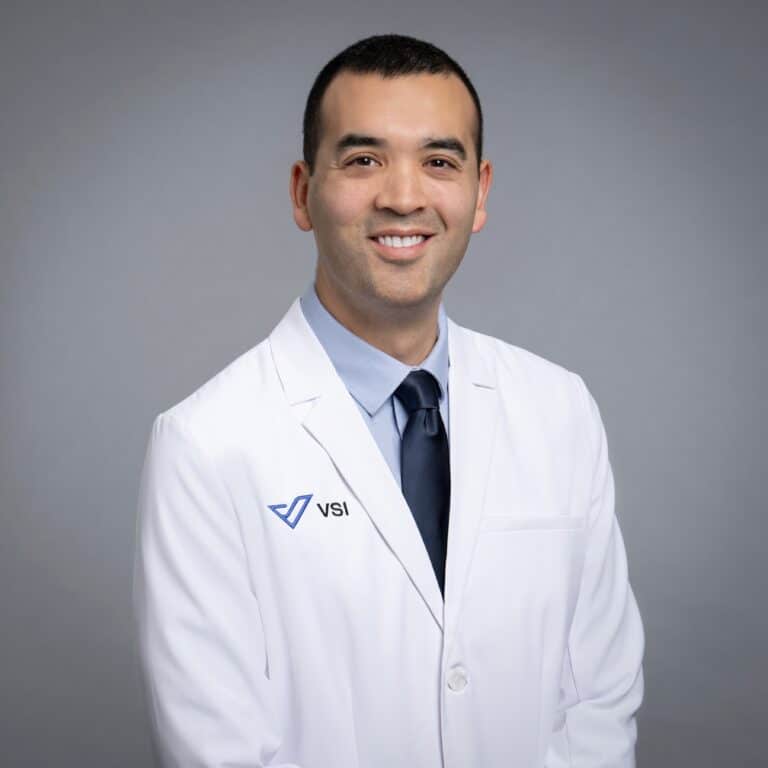VSI Research Shows Stem Cell Therapy Improves Low Back Pain
NEW Research Findings: Intradiscal injection of autologous bone marrow aspirate concentrate improves low back pain at one year
The spine surgeons and the director of regenerative medicine at Virginia Spine Institute initiated a research study to prove the effectiveness of bone marrow aspirate concentrate (BMAC), widely known as stem cell therapy, to resolve low back pain. The findings of this one-year study suggest that intradiscal injection of autologous bone marrow aspirate concentrate (BMAC) has the potential to be an effective non-surgical treatment for chronic discogenic low back pain.
Chronic low back pain is one of the leading causes of disability and poor quality of life in the US and worldwide. A common cause of chronic low back pain is degenerative disc disease. Current non-surgical treatments for degenerative disc disease-associated low back pain are typically effective. However, for patients who fail these treatments, surgical fusion is often used as a last-line treatment. Surgical treatment is associated with higher healthcare expenditures and a more invasive procedure. As such, there is growing interest in the field of regenerative medicine and stem cell therapy as a less invasive treatment for low back pain.
Stem Cell Therapy Study Methods
A total of 32 consecutive patients over the age of 18 years diagnosed with discogenic low back pain clinically or by discography who underwent injection of autologous intradiscal bone marrow aspirate concentrate (BMAC) at a single multi surgeon orthopedic spine center were included in this study. Active smokers and patients who had pain generators other than purely discogenic pain were excluded. For the primary analysis, patients completed baseline and 1-year post-injection ODI, VAS back, VAS leg, and EQ-5D-5L questionnaires; their scores were compared over time. Preprocedural lumbar MRIs were reviewed for Modic changes and assigned a Pfirrmann grade. 13 postprocedural MRIs were available and reviewed using the same parameters.
Stem Cell Therapy Research Study Results
Thirty-two patients (56.3% male) with a mean age of 45.9 (range 19-65) underwent BMAC injection between 1 and 6 levels completed 1 year follow up. Mean VAS back and leg scores improved from 54.0 to 30.4 (p<0.001) and 27.9 to 13.3 (p=0.005), respectively. Mean ODI scores decreased from 33.5 to 21.1 (p<0.001), and EQ-5D-5L scores improved from 0.69 to 0.78 (p=0.001). Using established minimum clinically important difference values, 59.4% of patients saw a clinically significant improvement in VAS back pain, 43.8% in VAS leg pain, and 56.3% in ODI scores. On pre-procedural MRIs, 62.5% of patients had a Modic score of 1 or 2, and 93.8% had a Pfirrmann grade of 3 or higher. Postprocedural MRIs were available for 13 patients, and 61.5% had no measurable change in Pfirrmann grade. Three patients worsened by one Pfirrmann grade and one improved by 1 grade.
Intradiscal injection of autologous BMAC was shown to significantly improve pain and quality of life at one year. Additionally, this study meets 88% of recently published AAOS reporting standards for studies relating to mesenchymal stem cells. The results of this study suggest that intradiscal injection of autologous BMAC has the potential to be an effective non-surgical treatment for chronic discogenic low back pain.
Topics covered
About the Author
Featured Resources
Insights to Achieve a Pain-Free Life


